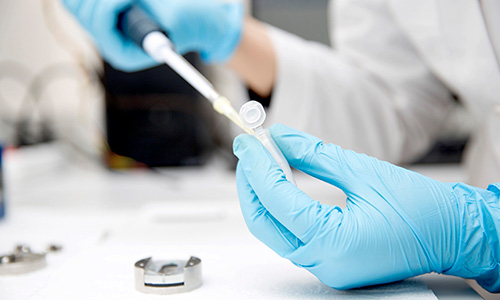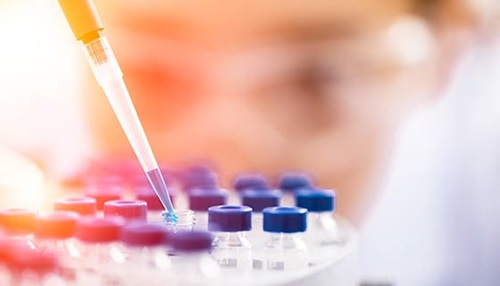Can Being on a Ventilator Cause Brain Damage
COVID-19 Lung Damage
Featured Experts:
Like other respiratory illnesses, COVID-nineteen tin crusade lasting lung impairment. As we continue to learn well-nigh COVID-19, we're understanding more regarding how it affects the lungs during acute illness and after.
Panagis Galiatsatos, Thousand.D., Thou.H.S., is an skillful on lung disease at Johns Hopkins Bayview Medical Eye and sees patients with COVID-19. He explains some of the short- and long-term lung bug brought on by the new coronavirus.
What does COVID practise to lungs?
COVID-19 can cause lung complications such equally pneumonia and, in the most severe cases, acute respiratory distress syndrome, or ARDS. Sepsis, another possible complication of COVID-xix, can too cause lasting impairment to the lungs and other organs.
"Every bit we have learned more nigh SARS-CoV-2 and resulting COVID-19, nosotros have discovered that in severe COVID-19, a significant pro-inflammatory condition can upshot in several critical diseases, complications and syndromes," Galiatsatos says.
COVID-19 Pneumonia
In pneumonia, the lungs go filled with fluid and inflamed, leading to breathing difficulties. For some people, breathing issues can become severe enough to crave treatment at the infirmary with oxygen or fifty-fifty a ventilator.
The pneumonia that COVID-19 causes tends to take hold in both lungs. Air sacs in the lungs fill with fluid, limiting their ability to take in oxygen and causing shortness of breath, cough and other symptoms.
While most people recover from pneumonia without any lasting lung impairment, the pneumonia associated with COVID-xix tin can be severe. Even after the affliction has passed, lung injury may result in breathing difficulties that might take months to improve.
Acute Respiratory Distress Syndrome (ARDS)
As COVID-xix pneumonia progresses, more of the air sacs become filled with fluid leaking from the tiny claret vessels in the lungs. Eventually, shortness of breath sets in, and can pb to acute respiratory distress syndrome (ARDS), a form of lung failure. Patients with ARDS are often unable to breath on their own and may require ventilator support to help circulate oxygen in the torso.
Whether it occurs at home or at the hospital, ARDS tin can be fatal. People who survive ARDS and recover from COVID-xix may have lasting pulmonary scarring.
Sepsis
Some other possible complication of a severe case of COVID-19 is sepsis. Sepsis occurs when an infection reaches, and spreads through, the bloodstream, causing tissue damage everywhere information technology goes.
"Lungs, centre and other torso systems work together similar instruments in an orchestra," Galiatsatos says. "In sepsis, the cooperation between the organs falls apart. Entire organ systems can beginning to shut downwards, 1 after another, including the lungs and middle."
Sepsis, fifty-fifty when survived, can leave a patient with lasting damage to the lungs and other organs.
Superinfection
Galiatsatos notes that when a person has COVID-xix, the allowed organisation is working hard to fight the invader. This can leave the body more vulnerable to infection with another bacterium or virus on top of the COVID-19 — a superinfection. More than infection tin result in boosted lung impairment.

Coronavirus (COVID-19) Email Alerts
Sign upward to receive coronavirus (COVID-19) e-mail updates from Johns Hopkins Medicine.
Three Factors in Coronavirus Lung Damage
Galiatsatos notes three factors that affect the lung damage gamble in COVID-19 infections and how likely the person is to recover and regain lung part:
Disease severity. "The first is the severity of the coronavirus infection itself — whether the person has a mild case, or a severe one," Galiatsatos says. Milder cases are less probable to cause lasting scars in the lung tissue.
Wellness conditions. Galiatsatos says, "The second is whether there are existing health problems, such as chronic obstructive pulmonary illness (COPD) or heart disease that can enhance the hazard for severe illness." Older people are also more vulnerable for a severe instance of COVID-xix. Their lung tissues may be less rubberband, and they may have weakened immunity considering of advanced historic period.
Treatment. "Treatment is the third factor," he says. "A patient's recovery and long-term lung wellness is going to depend on what kind of care they get, and how quickly." Timely back up in the hospital for severely sick patients can minimize lung damage.
Can coronavirus patients lessen the chance of lung impairment?
At that place are things patients can do to increment their chances for less severe lung impairment, Galiatsatos says.
"If you lot have a health issue that puts you at college risk, brand sure you lot're doing everything you lot can to minimize the take a chance of contracting the virus. Also, make certain that your chronic health conditions are managed likewise every bit they tin can be. For example, people living with diabetes, COPD or heart disease should be especially careful to manage those conditions with monitoring and taking their medications as directed."
Galiatsatos adds that proper nutrition and hydration can also help patients avoid complications of COVID-19. "Staying well fed is important for overall health. Proper hydration maintains proper blood book and good for you mucous membranes in the respiratory organization, which tin can aid them better resist infection and tissue damage."

Coronavirus: Smoking, Vaping, Wildfire Smoke and Air Pollution
Our good, Panagis Galiatsatos, One thousand.D., M.H.S. discusses how smoking, vaping and air pollution might increase the severity of COVID-19. Acquire near how each of these could affect a COVID-19 diagnosis.
Is COVID-nineteen lung harm reversible?
After a serious example of COVID-19, a patient'due south lungs tin recover, but not overnight. "Recovery from lung damage takes time," Galiatsatos says. "There's the initial injury to the lungs, followed by scarring. Over fourth dimension, the tissue heals, only it can accept three months to a year or more for a person'southward lung function to render to pre-COVID-xix levels.
"Lung healing in of itself can produce symptoms," Galiatsatos says. "Information technology is like to a leg os breaking, needing a cast for months, and having the cast come off. No one would expect to begin to run correct away with the newly-healed leg bone. As the leg strengthens and muscle re-grows, patients will feel discomfort from this healing. This is what our lungs go through, too!"
He notes that doctors and patients akin should exist prepared for continuing treatment and therapy.
"Once the pandemic is over, at that place will be a group of patients with new wellness needs: the survivors. Doctors, respiratory therapists and other health care providers will need to assist these patients recover their lung function every bit much as possible."

Coronavirus (COVID-19)
What you need to know from Johns Hopkins Medicine.
Source: https://www.hopkinsmedicine.org/health/conditions-and-diseases/coronavirus/what-coronavirus-does-to-the-lungs

0 Response to "Can Being on a Ventilator Cause Brain Damage"
Post a Comment